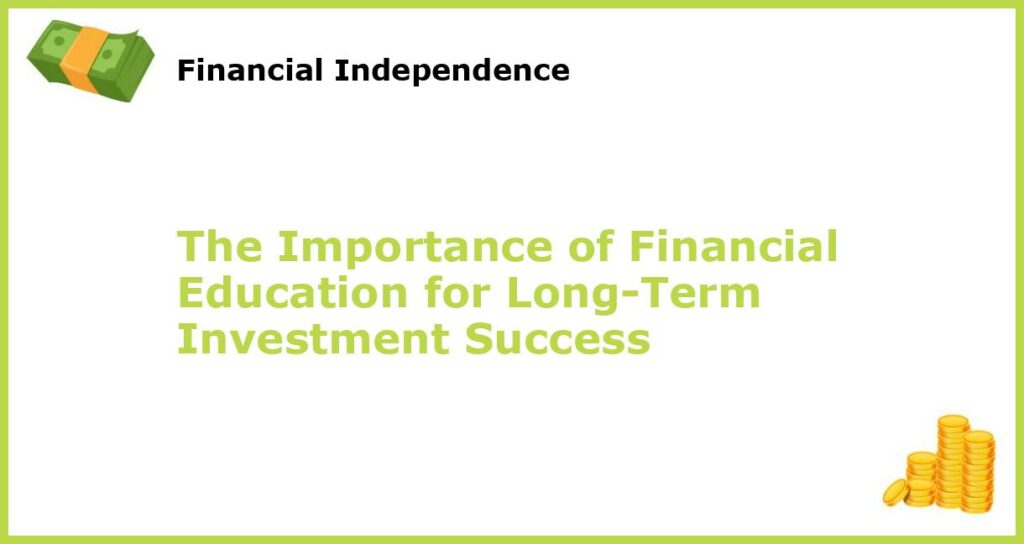They say money can’t buy happiness, but it can certainly help you achieve financial security and independence. And the key to achieving that security is through long-term investment success. Whether you’re just starting out or have been investing for years, financial education is essential to help you make informed decisions and avoid costly mistakes. In this article, we’ll explore the different aspects of financial education that are essential to achieving long-term investment success.
Understanding Investment Options

When it comes to investing, the choices can be overwhelming. From stocks and bonds to mutual funds and real estate, it can be difficult to know where to start. That’s where financial education comes in. By understanding the different investment options available, you can make informed decisions about where to invest your money. For example, if you’re looking for long-term growth, stocks may be a good choice. On the other hand, if you’re looking for a more stable investment, bonds may be a better fit for you. Financial education will help you understand the pros and cons of each investment option and choose the ones that align with your goals and risk tolerance.
Learning to Read Financial Statements

Financial statements can be intimidating, but they’re an important tool in assessing the financial health of the companies you want to invest in. By understanding financial statements, you can analyze a company’s profitability, debt levels, cash flow, and other key financial metrics. This knowledge will help you make smart investment decisions and avoid investing in companies that are not financially sound. Financial education will teach you how to read financial statements and make informed decisions based on the information they provide.
Diversifying Your Portfolio

Diversification is one of the most important strategies for long-term investment success. By investing in a variety of assets, you can spread your risk and minimize the impact of any one investment performing poorly. For example, if you invest only in tech stocks and the tech industry experiences a downturn, your entire portfolio would suffer. However, if you have a diversified portfolio that includes stocks, bonds, and real estate, the impact of the tech downturn would be minimized. Financial education will help you understand the importance of diversification and how to implement it properly.
Understanding Your Risk Tolerance

Investing always involves some level of risk. However, the level of risk you’re comfortable taking on depends on a variety of factors, including your age, income, goals, and personality. Financial education will help you understand your risk tolerance and make informed decisions about where to invest your money. For example, if you’re close to retirement and don’t want to take on too much risk, you may opt for more conservative investments like bonds. On the other hand, if you’re young and have a long investment horizon, you may be comfortable taking on more risk for the potential of higher returns.
Sticking to a Plan

One of the biggest mistakes investors make is not having a plan and not sticking to it. A solid investment plan will help you stay focused and make informed decisions about your investments. For example, you may decide to invest a certain percentage of your income each month or rebalance your portfolio annually. Financial education will teach you the importance of having a plan and sticking to it, even when the market is volatile or emotions are running high.
Managing your Emotions
Investing can be an emotional rollercoaster. When your investments are doing well, you may feel overconfident and want to take on more risk. Conversely, when the markets are down, you may panic and want to sell everything. Financial education will teach you how to manage your emotions and make decisions based on logic and reasoning rather than emotions. By managing your emotions, you can make better investment decisions and avoid costly mistakes.
Time in the Market is Key
Investing is a long-term game, and time in the market is more important than timing the market. Financial education will teach you about the power of compounding, and how investing for the long term can be more beneficial than trying to time the market. For example, if you had invested in the S&P 500 in 1980 and held onto it until 2020, your returns would be over 2,000 percent. However, if you had tried to time the market and missed out on the top 10 best days, your returns would be just 704 percent. By understanding the importance of time in the market, you can make informed decisions about your investments and avoid the pitfalls of trying to time the market.
Staying Informed
Markets are constantly changing, and it is important to stay up to date with the latest news and trends. Financial education will teach you how to stay informed about the markets and make informed decisions about your investments. For example, you may follow financial news sites, industry publications, or attend investing conferences. By staying informed, you can adjust your investment strategy as needed and avoid costly mistakes.
Setting Realistic Goals
Investing is a marathon, not a sprint. It’s important to set realistic goals and stay motivated on your long-term investment strategy. For example, you may set a goal to save a certain amount each month or to retire at a certain age. However, setting unrealistic goals can lead to frustration and disappointment, and may cause you to make rash decisions about your investments. Financial education will teach you how to set realistic goals and stay motivated on your long-term investment journey.
The Value of Professional Advice
While it is possible to manage your investments on your own, a financial advisor can provide valuable guidance and advice. Financial education will help you understand the value of professional advice and how it can help you achieve your long-term financial goals. For example, a financial advisor can provide personalized investment recommendations, help you rebalance your portfolio, and keep you informed about market trends. By working with a professional, you can make informed decisions about your investments and stay on track to achieve your financial goals.







